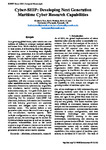Cyber-SHIP: Developing Next Generation Maritime Cyber Research Capabilities
| dc.contributor.author | Tam, K | |
| dc.contributor.author | Forshaw, K | |
| dc.contributor.author | Jones, Kevin | |
| dc.date.accessioned | 2020-06-30T15:13:41Z | |
| dc.date.issued | 2019-11-05 | |
| dc.identifier.uri | http://hdl.handle.net/10026.1/15823 | |
| dc.description.abstract |
<jats:p> As a growing global threat, cyber-attacks can cost millions of dollars or endanger national stability and human lives. While relatively well understood in most sectors, it is becoming clear that, although the maritime sector is becoming more digitally advanced (e.g., autonomy), it is not well protected against cyber or cyber-physical attacks and accidents. To help improve sector-wide safety and resiliency, the University of Plymouth (UoP) is creating a specialised maritime-cyber lab, which combines maritime technology and traditional cyber-security labs. This is in response to the lack of research and mitigation capabilities and will create a new resource capability for academia, government, and industry research into maritime cybersecurity risks and threats. These lab capabilities will also enhance existing maritime-cyber capabilities across the world, including risk assessment frameworks, cybersecurity ranges/labs, ship simulators, mariner training programmes, autonomous ships, etc. The goal of this paper is to explain the need for next generation maritime-cyber research capabilities, and demonstrate how something like the proposed Cyber-SHIP Lab (Hardware, Software, Information and Protections) will help industry, government, and academia understand and mitigate cyber threats in the maritime sector. The authors believe a next generation cyber-secure lab should host a range of real, non-simulated, maritime systems. With multiple configurations to mirror existing bridge system set-ups, the technology can be studied for individual system weakness as well as the system-of-systems vulnerabilities. Such as lab would support a range of research that cannot be achieved with simulators alone and help support the next generation of cyber-secure marine systems. </jats:p> | |
| dc.language.iso | en | |
| dc.publisher | IMarEST | |
| dc.subject | Generic health relevance | |
| dc.title | Cyber-SHIP: Developing Next Generation Maritime Cyber Research Capabilities | |
| dc.type | conference | |
| plymouth.date-start | 2019-11-05 | |
| plymouth.date-finish | 2019-11-07 | |
| plymouth.conference-name | International Conference on Marine Engineering and Technology Oman | |
| plymouth.publication-status | Published | |
| plymouth.journal | Conference Proceedings of ICMET Oman | |
| dc.identifier.doi | 10.24868/icmet.oman.2019.005 | |
| plymouth.organisational-group | /Plymouth | |
| plymouth.organisational-group | /Plymouth/Faculty of Science and Engineering | |
| plymouth.organisational-group | /Plymouth/Faculty of Science and Engineering/School of Engineering, Computing and Mathematics | |
| plymouth.organisational-group | /Plymouth/Faculty of Science and Engineering/School of Engineering, Computing and Mathematics/SoECM - Manual | |
| plymouth.organisational-group | /Plymouth/REF 2021 Researchers by UoA | |
| plymouth.organisational-group | /Plymouth/REF 2021 Researchers by UoA/UoA11 Computer Science and Informatics | |
| plymouth.organisational-group | /Plymouth/Users by role | |
| plymouth.organisational-group | /Plymouth/Users by role/Academics | |
| dcterms.dateAccepted | 2019-11-05 | |
| dc.rights.embargodate | 2020-7-2 | |
| dc.rights.embargoperiod | Not known | |
| rioxxterms.versionofrecord | 10.24868/icmet.oman.2019.005 | |
| rioxxterms.licenseref.uri | http://www.rioxx.net/licenses/all-rights-reserved | |
| rioxxterms.licenseref.startdate | 2019-11-05 | |
| rioxxterms.type | Conference Paper/Proceeding/Abstract |


